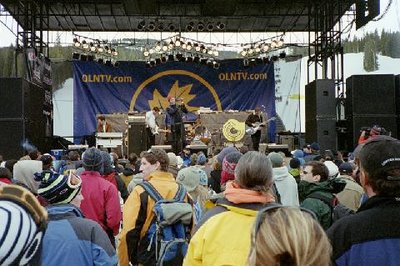 Woman in a Maquiladora (foreign-owned assembly plant) on the Mexico-U.S. border in Maquila: A Tale of Two Mexicos.
Woman in a Maquiladora (foreign-owned assembly plant) on the Mexico-U.S. border in Maquila: A Tale of Two Mexicos.Latino/Hispanic Heritage Month, celebrated nationally from September 15 through October 15, recognizes the rich cultural influence of the quickly growing minority.
Congress created the observance more than 20 years ago, originally as a weeklong event. But, by 1989 the event had become so well regarded and ethnically important that the government expanded it into a month long celebration.
As part of the awareness-raising efforts, City College hosts a film series titled Understanding Latino Culture.
Documentary filmmaker and adjunct professor of Latin American Studies, Greg Landau, contributed two videos to the series. Landau, 47, is a soft-spoken, ostensibly modest man despite his overflowing list of accomplishments. A two-time Grammy nominee, Landau also serves on the Board of Governors for the Grammy organization. He has produced more than 30 CDs and film soundtracks, and worked on numerous documentaries and videos.
Maquila: A Tale of Two Mexicos musically scored by Landau and produced by his father, Saul, takes a sobering look at the manufacturing industry in the northern border cities of Mexico such as Juarez and Tijuana. The film illustrates the harsh reality of the transitional effects of industrial globalization on both rural and urban communities.
Maquila examines and draws conclusions about the ethical conduct of multinational corporations that set up shop in Mexico seeking cheap labor. An unnerving contrast of perspective depicts English-speaking maquila managers defending (or denying) their actions while conversely, English subtitles translate desperate factory workers telling stories of inhumane treatment.
Maquiladoras soon developed as a result of the North American Free Trade Agreement of 1994, between the United States, Canada, and Mexico. Maquilas were intended to boost the Mexican economy. But, low wages, lack of union organization, and the abolition of the Mexican Constitution's Article 27 which protects the communal use of land, created a setback rather than a progressive, in-works solution. The free trade treaty brought competition for land. Consequently, farmers had to make way for the construction of the factories. As a result, rural agricultural systems are ever disintegrating, forcing farmers and peasants off their indigenous lands and into the urban workforce.
In addition to the failing economical construct of maquilas, Mexican sociologists discuss their pollution's human toll and the lack of environmental regulation. One sociologist interviewed tells the story of a peasant girl burnt by acid when she accidentally falls into a river swelling with toxic sludge. Camera shots of once green trees are shown wilting gray with fiberglass residue. Elderly folks discuss the unexplained skin blotches that ornament their skin while farmers wonder why their chickens are dying.
Women face additional safety issues in these border towns. Leaving maquilas after work in Juarez, women face unprecedented risk of rape and murder. Today hundreds of cases remain unsolved, and families wait in vain for justice to be served.
Viewing the film takes a strong stomach, but it is well worth the discomfort. Exposure to the reality of such activity, to see firsthand the issues Mexico faces, to better understand globalization and the rising world market, makes this video absolutely essential.
Landau produced the second video, Five Days in March, directed by revered Oscar winning filmmaker, Haskell Wexler. "I can't say enough good things about these two radical documentarians," says The Indigo Girls' Amy Ray in her online travel diary. "[Greg's] work is very important...Haskell is an older gentlemen who came up through the activism of labor politics, opposing McCarthyism, civil rights, etc."
The two filmmakers were invited to be the official documenters of a song-writing workshop and cultural exchange program fittingly titled Music Bridges, between famous Cuban and US musicians in Havana in March, 1999. U.S. artists included Montell Jordan, Mick Fleetwood, the Indigo Girls, Bonnie Rait, Gladys Knight, and Joan Osbourne, among many others.
"What the organizers were looking for was a kind of MTV documentary, but what we saw and felt in Cuba at that particular time, it didn't seem very appropriate," says Landau. "With the transitional time in Cuban history we felt compelled to document more of the Cuban musical culture, rather than follow all the rock stars around."
Five Days is full of spontaneous "freestyle" sessions, as camera crews follow artists through various city scenes, stumbling upon musical talent amid the labyrinth of streets. The film touches upon elements of Cuban culture such as the influence of Che Guevara, baseball, and the Afro-Cuban Santeria religion. Far from apolitical, this film is a positive, poignant tribute to the people of Cuba, and the unique lives they lead under the dictate of Fidel Castro.
Landau will lead a group of students and faculty to Cuba for a two-week study abroad anthropology class. Open to all, with an overall cost estimated at $2,500, the class will explore colonial cities and museums, and talk with Cuban intellectuals, writers, poets, and anthropologists. It will cover the development of Cuban culture, the African-Spanish influence, folkloric history, and other relevant Cuban issues.




